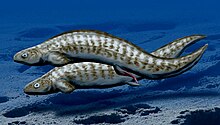Chondrenchelys is an extinct genus of cartilaginous fish[1] and the earliest member of Holocephali known from complete skeletons.[2] Chondrenchelys would have been quite a relatively medium-sized fish with an elongated body up to 18 cm (0.59 ft)in length,[2] it had a dorsal fin which was indeed long and a body which tapered to a point. Chondrenchelys had one large pair, one middle-sized pair, and three small pair of tooth plates in each jaw.[2] The genus name derives from the Greek word χόνδρος, meaning “gristle” or “cartilage”, and ἔγχελυς, meaning “eel”. The speciea name, problematicus, is likely derived from the lack of scales setting it apart from all other fish known at the time of discovery.[3]
| Chondrenchelys Temporal range:
| |
|---|---|

| |
| Scientific classification | |
| Kingdom: | |
| Phylum: | |
| Class: | |
| Order: | |
| Family: | |
| Genus: | Chondrenchelys Traquair, 1888
|
| Species: | C. problematica
|
| Binomial name | |
| Chondrenchelys problematica Traquair, 1888
| |
See also
editReferences
edit- ^ Richard Lund (1982). "Harpagofututor volsellorhinus new genus and species (Chondrichthyes, Chondrenchelyiformes) from the Namurian Bear Gulch Limestone, Chondrenchelys problematica Traquair (Visean), and their sexual dimorphism". Journal of Paleontology. 56 (4): 938–958. JSTOR 1304712.
- ^ a b c Finarelli, John A.; Coates, Michael I. (1 March 2014). "Chondrenchelys problematica (Traquair, 1888) redescribed: a Lower Carboniferous, eel-like holocephalan from Scotland". Earth and Environmental Science Transactions of the Royal Society of Edinburgh. 105 (1): 35–59. doi:10.1017/S1755691014000139. S2CID 130533675.
- ^ Traquair, R. H. (March 1888). "II.—Further Notes on Carboniferous Selachii". Geological Magazine. 5 (3): 101–104. doi:10.1017/S0016756800173467.